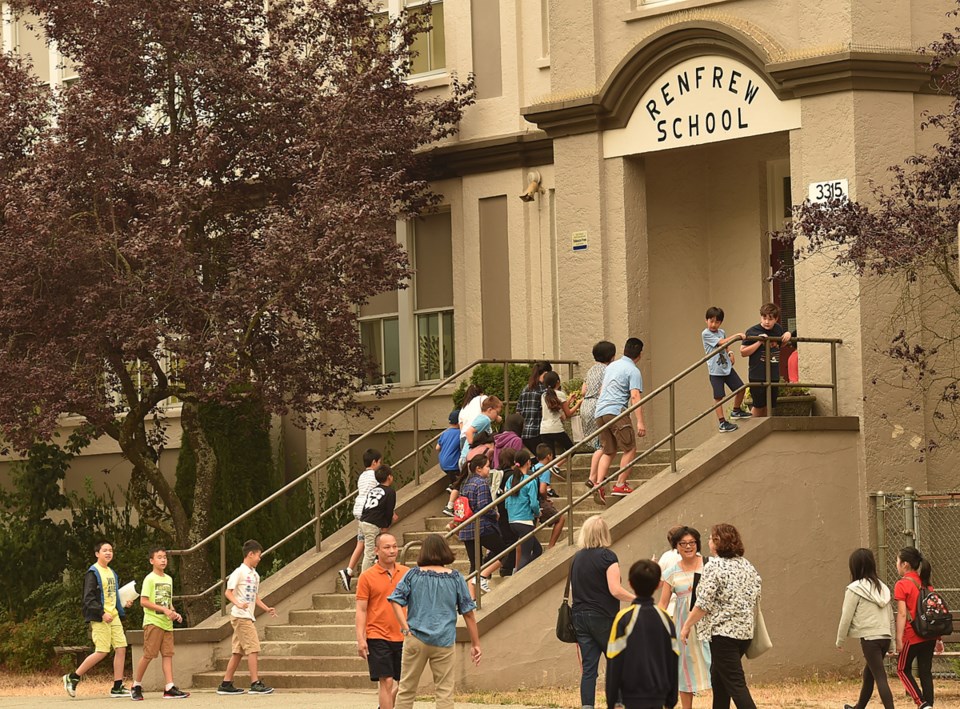Is Vancouver housing too expensive for teachers?
Katharine Shipley, president of the Vancouver Secondary Teachers’ Association thinks the sky-high housing costs could be deterring potential teachers from taking some of the 342 new jobs created after last fall’s Supreme Court of Canada decision. That decision restores rules about class sizes, the numbers of specialist teachers and how many special-needs students can be in one class that were stripped from teachers’ contracts in 2002.
Districts throughout the province are scrambling to hire about 2,600 new teachers, and Shipley says she thinks Vancouver may be at a disadvantage because of sky-high housing prices when it comes to attracting and keeping regular teachers and teachers on call.
She says more than 80 teachers have left Vancouver for other districts. When members call her to tell her they’re leaving, they often say it’s because they’ve bought a house somewhere more affordable, such as the Okanagan or Maple Ridge, or because they already live in the suburbs and the recent hiring surge is their chance to finally work closer to home.
“This was the year — if you live in Surrey and commute into Vancouver — this was the year that you were going to finally get a job in your district or in a district where you could afford something more than a closet,” Shipley said. “For teachers this year, it has been fantastic in terms of mobility.”
She would like to see the Vancouver School Board get into the non-profit housing business, specifically to provide affordable homes for teachers.
“One thing the Vancouver School Board does have this land and one thing for them to think about is not-for-profit, subsidized employee housing,” Shipley said. “The board can’t grow teachers on trees and the affordability crisis is bigger than the school board, but they do have an asset and that is land.”
Providing affordable housing for employees is something many sectors may need to consider in Metro Vancouver, given that the cost of housing is way out of whack with wages in B.C.
Recently Shipley was surprised when a new teacher to Vancouver approached the association, asking if it helps teachers find housing. So far, that’s not something the association has considered.
Hundreds of teaching positions were posted by VSB in the final weeks of summer. Schools were told to reduce their expectations by about 80 full-time teachers across the district, Shipley said. That last-minute change was because Vancouver got less provincial funding than it expected to meet the contract terms. In June, interim superintendent John Lewis said VSB asked for more than 400 teachers. VSB’s official, appointed trustee Dianne Turner, said VSB got funding for 342 full-time teachers.
At the end of August, there were still unfilled jobs and the teacher on call list was decimated.
The number of teachers on call (TOCs) in Vancouver is now about 400, compared to a healthy number of about 800, Shipley said.
“They have been working flat out, all summer to hire people. They are doing their absolute best,” Shipley said. “As fast as they hire TOCs, TOCs are posting into other positions or leaving for other districts. That’s going to be a huge disruption on a day-to-day basis.”
When there is a shortage of TOCs, regular teachers are sometimes called in to help during their preparation blocks. In elementary schools, sometimes the resource teachers are called in to cover a regular classroom, which means the kids who need extra help from a resource teacher don’t get it.
Turner said in a statement that every school in Vancouver will have more teachers than in previous years. “There have not been cuts,” she said.
Turner said she hopes to have an update on the number of open positions by the end of the week, but that there will be a trained teacher in every classroom this month.
Education Minister Rob Fleming said the new NDP government’s fall budget (to be announced Sept. 11) will include a boost to the province’s $5.9-billion education budget to ensure the restored contracts are fully funded. The province and districts now have “a common understanding of what the language means in terms of a monetary commitment,” Fleming said.
Shipley is concerned that extra funding will be money to cover “remedies” for classes that don’t follow the rules, rather than money to set up classes according to the contract from the get go.
Shipley is prepared for some complaints as school resumes.
“After 16 years of feeling the austerity, there a whole emotional level at play,” she said. “I think we’re going to be dealing with quite a bit of disappointment. I don’t think class sizes will be as small as we were hoping.”
The final numbers won’t be available until the end of September.
Tracy Sherlock writes about education and social issues. She can be reached at [email protected].



